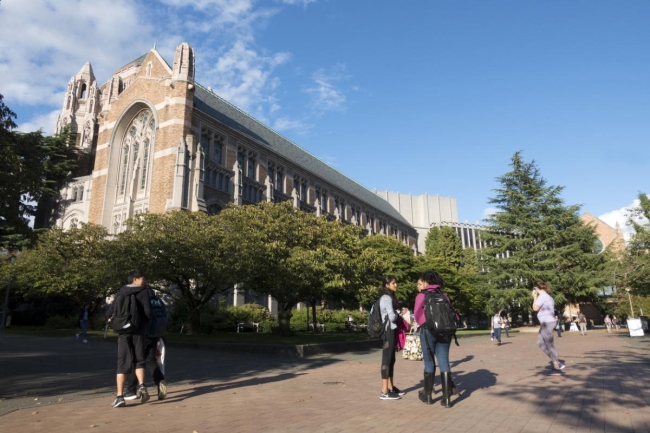You have /5 articles left.
Sign up for a free account or log in.

Istockphoto.com/aimintang
Campuses are quickly emptying as colleges opt to move instruction online and encourage social distancing to prevent the spread of the novel coronavirus. But for institutions that  are still occupied and still have full residence halls, administrators and student leaders are working together to keep students from interacting too closely -- even though socializing is a large part of the college experience.
are still occupied and still have full residence halls, administrators and student leaders are working together to keep students from interacting too closely -- even though socializing is a large part of the college experience.
Parties, talks by guest speakers, seminars and various other events that normally bring students together have all but disappeared on many campuses, helped in part by the arrival of spring break and decisions by a growing number of colleges to ask students not to return to their campuses after the break and to take classes online instead.
In Seattle, where the spread of the coronavirus has been extensive and deadly, the University of Washington campus remains open for students to access libraries, dining halls and dorms, but leaders of the Associated Students of the University of Washington, or ASUW, described it as a “ghost town.” The student government organization has canceled all but one of its events and meetings for the remaining week of the winter quarter, and other student groups have followed the lead of the ASUW, said President Kelty Pierce.
“We decided to err on the side of caution,” Pierce said. “There weren’t as many events left -- most happened earlier in the quarter -- but it was a precautionary measure to keep the health and safety of students in mind. There were a number of formals or social gatherings that were canceled within the Greek community, but there were large showings of support for this by students.”
Northwestern University in Evanston, Ill., near Chicago, canceled an annual dance marathon scheduled for March 6 through 8 that raises millions for charitable organizations in the local community. This year’s beneficiary, an organization that provides counseling and therapy for children, will likely still receive more than $20 million in donations from other fundraising efforts, but leaders of the Northwestern University Dance Marathon said in a statement that their “hearts are broken” and that they “understand it would have been a health risk to hold NUDM this weekend given the spread of coronavirus.”
Campus officials nationwide should be concerned about COVID-19 “due to the potential for rapid transmission in a congregate setting within campus environments,” according to guidelines issued by the American College Health Association. Classrooms and large events are not the only spaces where students are vulnerable to contracting the illness -- they live in dorms and share bathrooms with dozens of other people, eat in dining halls where buffet-style food is served, and attend parties where cups and e-cigarettes and rolled tobacco or marijuana and other smoking material are shared, said Sarah Van Orman, chief student health officer for the University of Southern California.
“We know that college students tend to live in larger communities and engage in certain activities that noncollege students don’t,” said Van Orman, who is a member of the ACHA COVID-19 task force. “Everybody needs to take a look at what they’re doing … ‘If I’m going into these settings, are there things that I can do to minimize risk?’”
It’s important for traditional college-aged students to remember that while they will likely avoid life-threatening symptoms, they could spread COVID-19 to at-risk groups on campus and in surrounding communities, generally people who are more than 60 years old or who have pre-existing health conditions, Van Orman said. Social distancing is recommended more for these groups, and for people who live in areas where there is widespread transmission, she said.
But even if students don’t meet these criteria, they should be proactive by refraining from being in any social environment with more than 30 people if it’s not essential for them to be there, said Debbie Beck, executive director of student health services at the University of South Carolina and a member of the ACHA task force. Bars and parties are especially risky because people are forced to speak loudly over music and saliva “droplets are coming out” of their mouths, Beck said.
“Limit social interactions,” Beck said. “We have to assume in our community that there is someone that has probably been in contact with or associated with someone who has had the virus.”
Three days before UW became one of the first colleges in the nation to move classes online, Erik Johnson, the president of the university’s Interfraternity Council, or IFC, said he required all fraternities on campus to halt social activities. He said spread of the virus through fraternity parties or other events was top of mind in his decision.
“We need to be cognizant of the fact that our community is young and healthy and the rest of people who are vulnerable to the coronavirus are outside the community,” Johnson said. “Seattle is in a very unique situation right now. This is unparalleled to other universities.”
There are always going to be small gatherings that chapter presidents can’t do much about, but IFC fraternities have largely abided by the social moratorium, and there have not been “noticeable” parties or other social events since, Johnson said. Members have expressed “disappointment and understanding” about the moratorium. Johnson said he anticipated more pushback given that it was the last week before finals.
On a national level, only a small number of colleges so far have put restrictions on large student organizations, such as sororities and fraternities, said Kevin Kruger, president of NASPA: Student Affairs Administrators in Higher Education.
Some fraternity headquarters, alumni and faculty, and alumni advisers are helping spread the word about university and Centers for Disease Control and Prevention guidelines to prevent contracting or spreading the coronavirus. UW students have been directed to avoid handshaking and general touching, and although they have not been advised explicitly about practicing safe sexual behaviors, the written guidance has implied it, Johnson said, by noting that the agency's guidelines recommend to "avoid close contact with people who are sick" and to "put distance between yourself and other people if COVID-19 is spreading in your community."
Phil Rodriguez, executive director of Delta Sigma Phi, said the national fraternity has advised chapters to individually formulate housing plans for if a fraternity member is diagnosed with COVID-19 and to communicate with student affairs officials.
“There’s definitely a conversation about being safe and smart as we navigate these unprecedented waters,” Rodriguez said.








